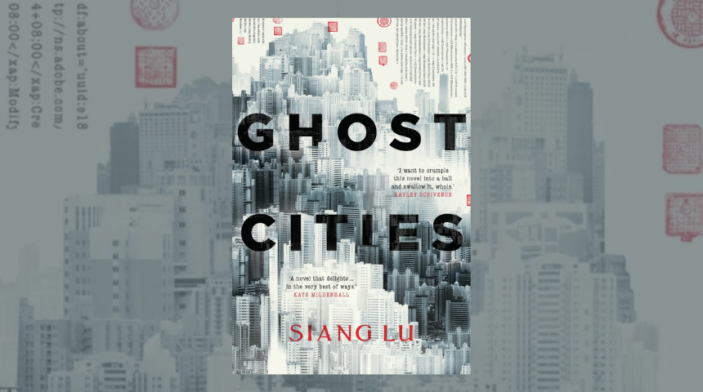
Following his well-regarded first novel The Whitewash, Siang Lu returns to long form fiction with his latest novel Ghost Cities, an unusual tale filled with imaginative twists and turns, philosophical discussions and sparks of dry humour.
Ghost Cities is a novel told in two parts. The first in the modern day, follows a young man named Xiang. It’s a roaring start to the novel when he is fired from his job translating Chinese to English due to not actually knowing Chinese, and instead relying on Google Translate for all his work. He quickly becomes a social media sensation, meets an infamous movie director and travels to the infamous Chinese ghost city Port Man Tou, a half-real, half-artificial movie set of a city.
Ancient China forms the setting of the other part of the novel. It’s a place where a cruel and paranoid Emperor rises to power, and those around him are forced to adapt to his whims or plot his demise. In contrast to the modern day sections, it is a fantastical tale in the classic style, featuring cunning scholars, outrageously clever (and kind of silly) schemes and tales of love and loss.
Both settings and both stories are a delight to read in completely different directions. The constant switching feels refreshing, a new outlook on events. Though while they are very different to read, in different styles and genres, their interwoven nature makes for a unique reading experience. Questions posed in one part are explored in another, and at times one side of the story echoes the other in a more tangible way – the all-powerful Emperors, the painting of A Simulated Man, the labyrinth which spans a city.
Combined with the novel’s many philosophical musing and conversations on various topics, it makes the novel a thoughtful read, one that I had to take a moment to stop reading and think about.
There is so much I can say about this novel in regards to its themes and the many meanings or musing that weave through the text. Its discussion of heritage and cultural disconnect, what it means to be a ‘#BadChinese’. Its unusual approach to the definition of authenticity and reality, with Port Man Tou the city of actor-citizens (and peeling back a layer further, the realisation at the end of the novel that the names of the protagonist’s family are based on the author’s own). The many parallels between the two cities and the rise and falls of their respective Emperors. It explores art, and language, and so much more. At times, it’s deeply philosophical and thoughtful, and at others absurdly funny – and at others still, it’s both.
All of that is to say – it’s fascinating. Ghost Cities is a weird novel, in the sense that it is unexpected and delightful. Its constant swapping between the two settings and meandering, thoughtful pace make for a slower read. But, it’s this pace which makes the novel so special in the first place. It’s funny, unexpectedly so, and intriguing, a combination which makes for a book that is hard to put down and even harder to forget once finished. I highly recommend this book for anyone looking for a novel with a bit of a different flavour.
![]()
![]()
![]()
![]()
![]()
FOUR STARS (OUT OF FIVE)
Ghost Cities by Siang Lu is available now from University of Queensland Press. Grab yourself a copy from Booktopia HERE.
